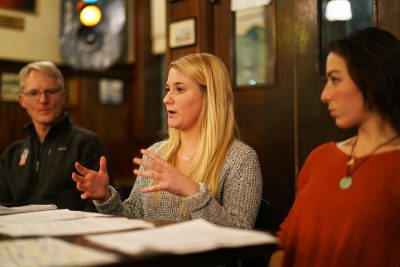
Approximately 20 Boston residents filled the back room of Doyle’s Cafe Wednesday evening, joining Equal Exchange, a worker owned cooperative, for a panel discussion on the organization’s new Action Forum.
Frankie Pondolph, an organizer for the Action Forum, said the goal of the Action Forum is to serve as a vehicle for individuals to engage as active participants in their food system in order to create a holistic democracy.
Wednesday’s discussion was Equal Exchange’s third presentation in Massachusetts and first in Jamaica Plain.
“[We organized the panel] to share information that we’ve learned in the past 30 years, operating as a worker on the worker owner coperative,” Pondolph told The Daily Free Press before the event.
Pondolph said Equal Exchange’s plan is to create a revolving series of events and to hold a summit in June.
“This is a space where we imagine the physical manifestation of the goals that we have to create a sense of democracy,” Pondolph said.
Danielle Robidoux, an organizer at Equal Exchange, said the cooperative planned the event to get the community talking.
“We’d like to facilitate organization among our support groups, which we feel has been lacking that democratic organization,” Robidoux told The Daily Free Press before the panel.
The panelists began by introducing themselves and emphasizing their desire for community involvement with the food industry.
“We invited you guys here to tell you about the new initiative that Equal Exchange is starting,” Robidoux said during the panel. “Historically, Equal Exchange was built upon this model of fair trade … [and] the Action Forum is the new path that we’ve created.”
Robidoux said Equal Exchange aims to continue building small farmer supply chains up from scratch.
“[We’re doing] old-school organizing, calling people on the phone,” Robidoux said. “We don’t know what [the Action Forum is] going to look like, but we know we want to create this systematic path from the ground up.”
Rob Everts, the co-executive director of Equal Exchange, addressed the history and past successes of the company.
“We’ve succeeded in building supply chains in coffee with … dozens [of organizations] around the world,” Everts said. “[We’ve] contributed in building a system that works for everybody along the line.”
Everts said Equal Exchange is one of the largest and strongest alternative trade organizations in the world.
“I’m personally proud because of the level of risk we take … to rescue several organizations who are like us: alternative trade organizations who are at risk of going under,” Everts said. “Fair trade has been completely digested and commodified.”
Several citizens who attended the panel said they supported Equal Exchange’s efforts to raise awareness of fair trade food practices.
Michael Clarizia, 44, of Roslindale, said he came to learn more about Equal Exchange and its charitable efforts.
“I went to school to learn how to grow cannabis, and I’ve been learning more about sustainable foods,” Clarizia said. “We have short growing seasons around here, so I was looking into freight farms and different organic farms that basically give organic food back to the community.”
Kim Kushner, 53, of Seekonk, said she decided to learn about fair trade for personal health reasons.
“I found out that a lot I was eating … that I thought was reasonably healthy was very unhealthy,” Kushner said. “It’s [about] knowing the truth of what I’m paying [for] and buying.”
Alexandria Diskin, 32, of Jamaica Plain, said she came to the panel to learn more about the food industry.
“I was hoping that I could benefit from the conversation in some of the trends that are happening in the … corporate takeover of the brands that we know and love,” Diskin said. “I knew very little about Equal Exchange … so it’s good to hear that they’re actually trying to create a leadership to engage people not only as consumers, but also as activists.”
Diskin said the community has a responsibility to speak out when they see corporations exploiting farmers.
“People focus a lot on the ingredients in their food because we can see that immediately on the back of the label, but for a lot of people that’s where it stops,” Diskin said. “We don’t think about how it got to the place that they’re buying it from [or] what went into creating the food.”




